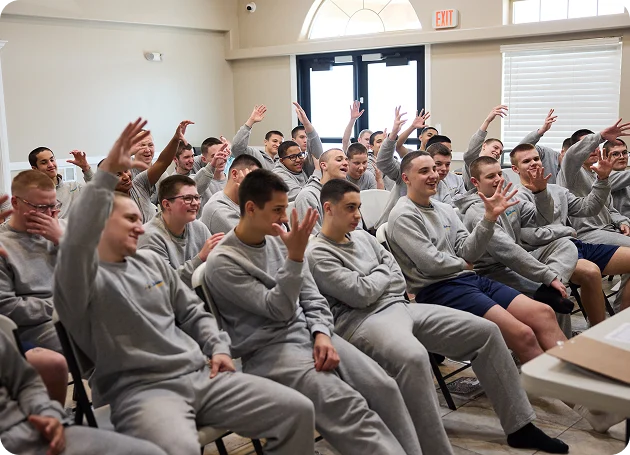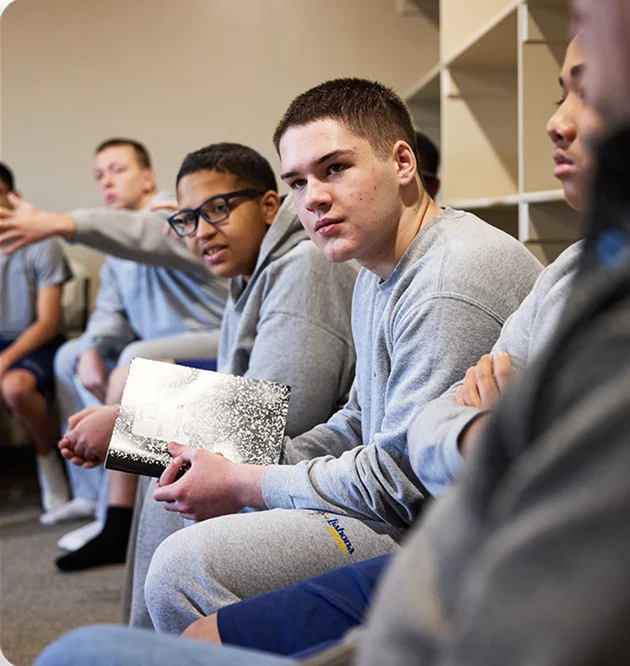You’re not alone. Our Care Advocates help every step of the way.
1. Learn all you can about ADD/ADHD to understand the disorder and to also help your teen to manage their symptoms. 2. Receive training in behavior therapy to learn strategies and skills required to help your child improve their lives and relationships both at home and in school. 3. Find a suitable therapist or treatment program to meet your teen’s unique needs. 4. Strengthen your support network by connecting with other parents of teens with ADD/ADHD.

Understanding ADD & ADHD
Both ADD (Attention Deficit Disorder) and ADHD (Attention Deficit Hyperactivity Disorder) are used interchangeably to refer to the same brain-based syndrome that disrupts the regulation of executive functioning skills such as concentration, attention, organization, motivation, and impulsivity, among others. However, the current correct medical terminology for this disorder is ADHD. The major symptoms of ADHD are impulsivity, inattentiveness, and hyperactivity. These symptoms typically begin in childhood and can persist to adulthood, becoming severe enough to affect an individual’s daily life. Although various contributing factors such as brain injuries or exposure to toxins or drugs during pregnancy were thought to be responsible for ADHD, scientists now believe that the structural and chemical imbalances that lead to the disorder occur mainly due to genetics. Teens can have one of three types of ADHD, namely:

- Inattentive ADHD where they have trouble concentrating and staying on task.
- Hyperactive-Impulsive ADHD where the teen is overly energized (hyper) and has trouble staying still or controlling impulses.
- Combined ADHD where individuals have symptoms of both Inattentive and Hyperactive-Impulsive ADHD.
While ADHD cannot be completely cured, it can be adequately managed using stimulants and other medication coupled with behavior therapy.
US Statistics on teen Attention Deficit Disorder and Attention Deficit Hyperactivity Disorder

- Data from the National Institute of Mental Health (NIMH) shows that approximately 2 million teens (3-5%) in the US have ADD/ADHD.
- The prevalence of ADD/ADHD is 2-3 times more common among teen boys than girls.
- Symptoms of ADD/ADHD vary between the sexes where girls with the disorder are inclined towards verbal aggression, withdrawal, and inattentiveness compared to boys who display more impulsivity, aggression and hyperactivity.
- Nearly 50% of teens diagnosed with ADD/ADHD also have a learning disability and 15-20% of these teens have a specific learning disability that is severe enough to affect their ability to effectively comprehend or use language.
- When it comes to treatment, stimulants have been found to be effective in 70-80% of ADD/ADHD teens while non-stimulants are effective for approximately 70% of cases.
- Driving presents a challenge for teens with ADHD and they get 4 times as many car wrecks as their peers and they are also 7 times more likely to have a second accident compared to other teenagers.
How Parents Can View Teen ADD/ADHD
Inattention
- Distractibility
- Forgetfulness
- Disorganization
- Procrastination and failure to complete chores or schoolwork
- Difficulty concentrating, staying on task or following instructions
Impulsivity
- Impatience
- Interrupting people
- Rash actions and decisions
- Easily aggravated.
- Finding it hard to wait to talk or react
Hyperactivity
- Fidgeting
- Restlessness
- Excessive talking
- Constant activity
How Teens View Their ADD/ADHD

Knowing what your teen is going through with ADD/ADHD helps you empathize with them and also makes you more supportive and patient with their shortcomings. Your teen probably feels:
- Depressed, anxious, guilty or embarrassed about their condition.
- Low self-confidence and poor self-esteem.
- Impatient and bothered by their failure to control how they act.
- Different from other teens and might find it hard to foster meaningful relationships with them.
- Doubtful about their capabilities although they might crave independence.

How Teens Can Help Themselves
- Taking prescribed medication to improve alertness and manage symptoms.
- Applying strategies and skills learned in behavior therapy to adjust behavior problems that come with ADHD.
- Sticking to regular meal schedules to keep their energy steady throughout the day.
- Taking part in co-curricular and after-school activities in order to learn how to interact with and befriend their peers.
- Finding ways to remember tasks and become more organized e.g. using notes and lists or adhering to regular routines.

Parents Can Help Their Teens With ADD/ADHD In The Following Ways
- Talking openly with their teen about ADD/ADHD and assuring them of their unfailing love and support.
- Getting their teens the therapeutic help they require to manage their ADD/ADHD.
- Getting trained in behavior therapy to learn how to help their teen improve their behavior and self-control.
- Providing straightforward, consistent rules, limits and expectations for their teens so they know what is acceptable and what isn’t.
- Affirming and rewarding positive behavior to build up their self-esteem.
- Keeping a daily structured schedule with set sleeping and waking up times as well as regular mealtimes.
- Assisting their teens to come up with a reminder system so they can stay on schedule and get their chores, school work, etc. done.
Liahona Residential Treatment Center Helps Parents Of Teens with Add/Adhd
At Liahona Residential Treatment Center, we know how difficult it is for parents to look after teens dealing with ADD/ADHD. You have to make several choices on how to best meet their unique academic, social and even therapeutic needs. It can be overwhelming and stressful, especially if you don’t have the right resources. Combining our wide network of therapeutic programs and qualified industry professionals, we have created a unique learning curriculum to help teens overcome stressful emotions related to ADD and ADHD. Our intervention, therapeutic setting, extracurricular activities, and group learning classes are designed to teach you to recognize the symptoms of their diagnosis and challenge them to manage these symptoms for a productive change in their lifestyle. For decades, we at Liahona Residential Treatment Center have successfully worked with hundreds of struggling teens and their families so you can trust us to help you with yours. We are confident that our extensive experience, professional resources, qualified staff, and our passion to foster healthy family relationships will assist you in creating the best environment to nurture your teen as well as giving them the help they need to manage their ADD/ADHD.